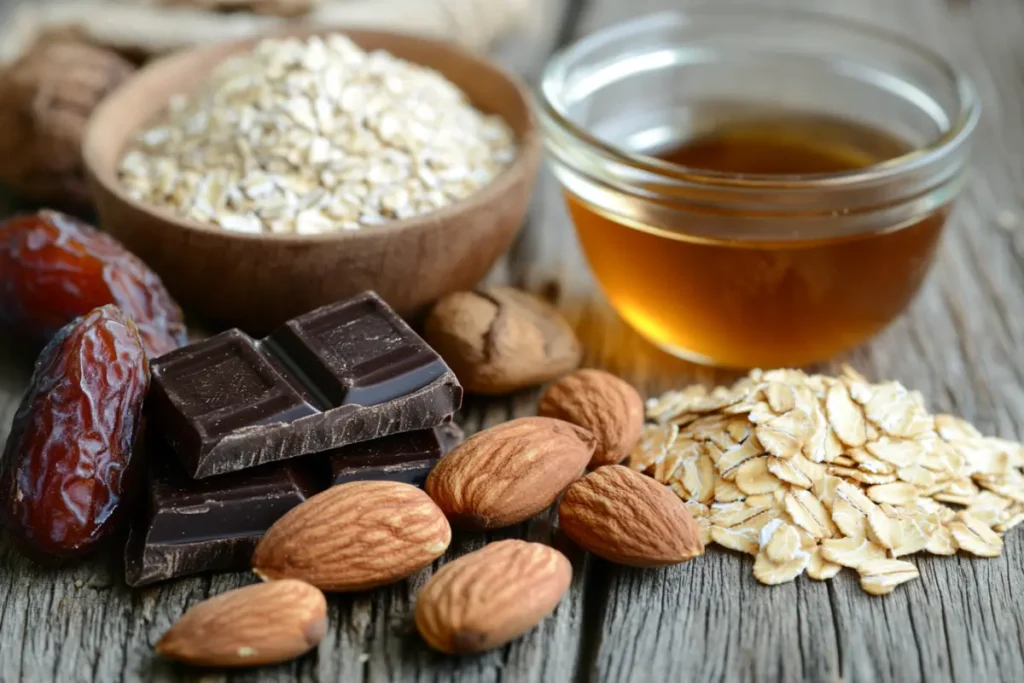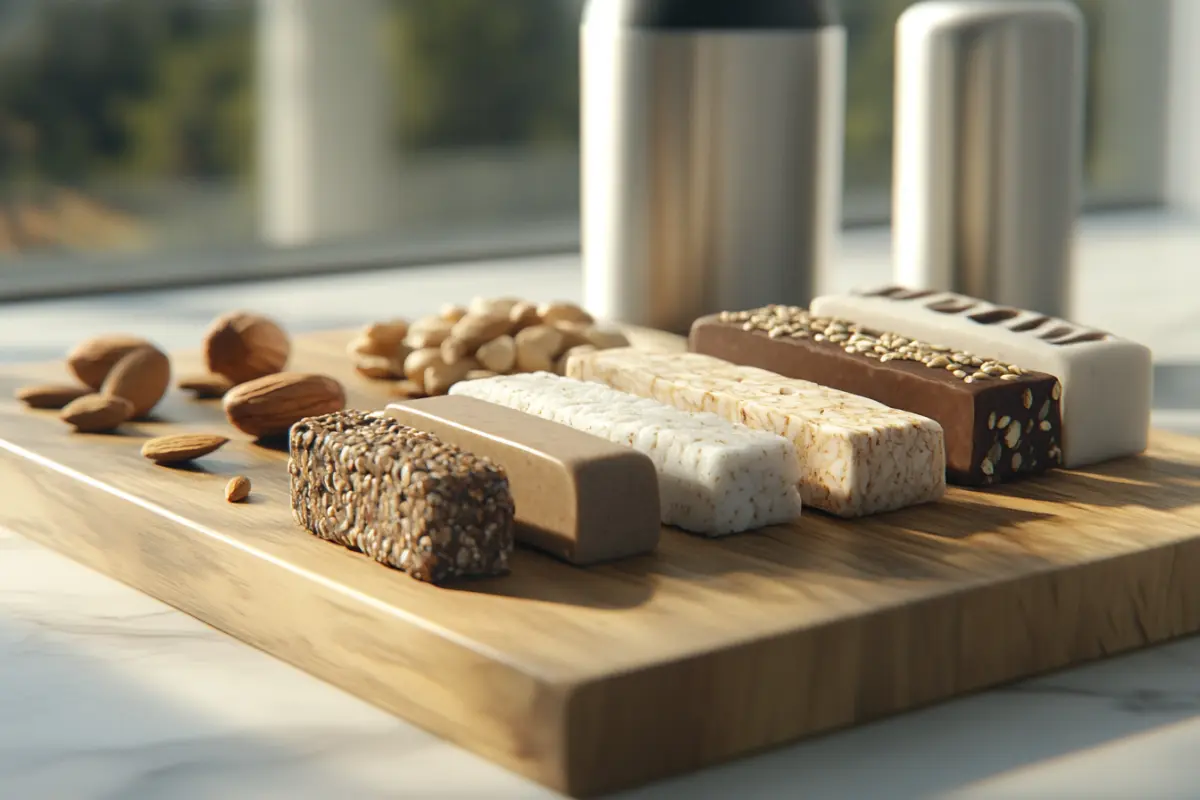Introduction
Protein bars have skyrocketed in popularity as a quick, on-the-go snack for busy professionals, fitness enthusiasts, and anyone looking for a convenient source of protein. Marketed as healthy, nutritious, and even weight-loss-friendly, these bars seem like the perfect solution for anyone trying to eat better. But are protein bars really healthy?
While they can be a great way to fuel up post-workout or curb hunger between meals, not all protein bars are created equal. Some are packed with sugar, artificial sweeteners, and highly processed ingredients, making them closer to candy bars than health foods. Others, however, boast high-quality protein, fiber, and healthy fats, offering a nutrient-dense alternative to traditional snacks.
This article will explore the benefits and drawbacks of protein bars, how to choose the healthiest options, and whether they are actually better than whole foods. By the end, you’ll have a clear answer to the question: Are protein bars really healthy?
Understanding Protein Bars
What Are Protein Bars Made Of?

Protein bars typically contain a blend of protein, carbohydrates, fats, and various additives. The protein source can come from whey, soy, pea, or brown rice protein, while carbs may include oats, honey, or artificial sweeteners. Some bars also contain healthy fats from nuts and seeds, while others rely on palm oil or hydrogenated fats—which aren’t as nutritious.
Different Types of Protein Bars
Not all protein bars serve the same purpose. Here are the main types:
- Meal Replacement Bars – Higher in calories and packed with essential nutrients.
- Post-Workout Bars – Designed to aid muscle recovery with a high protein content.
- Low-Carb or Keto Bars – Focused on minimal carbs and high fat for sustained energy.
- Whole Food-Based Bars – Made with natural ingredients like nuts, dates, and seeds.
Nutritional Breakdown: What’s Inside a Typical Protein Bar?
Depending on the brand, a protein bar can contain:
- Protein (10-25g) – Supports muscle recovery and keeps you full.
- Carbohydrates (10-40g) – Provides energy, but some bars contain excessive sugar.
- Fats (5-15g) – Can be healthy (from nuts) or unhealthy (from processed oils).
- Fiber (3-10g) – Aids digestion and promotes satiety.
Some protein bars are nutrient powerhouses, while others are just glorified candy bars. Understanding the ingredients is key to making a healthier choice.
The Health Benefits of Protein Bars
Protein bars offer a quick, convenient, and sometimes nutrient-packed snack for busy lifestyles. But are protein bars really healthy? While some are loaded with unhealthy additives, others can provide essential nutrients.
Convenient and Portable Nutrition
One of the biggest benefits of protein bars is their convenience. Unlike preparing a full meal, you can grab a protein bar on the go, making it a great snack option for people with busy schedules. Whether you’re traveling, working late, or need a quick bite before a workout, a protein bar can be a lifesaver.
High in Protein: Supports Muscle Growth and Recovery
Protein is essential for muscle repair and growth, and many athletes and fitness enthusiasts rely on protein bars as a post-workout snack. Bars with high-quality protein sources like whey, casein, or pea protein help with muscle recovery, especially after intense exercise.
Weight Management and Satiety Benefits
A well-balanced protein bar can help keep you full for longer, reducing cravings and unnecessary snacking. Some bars contain fiber, which slows down digestion and helps maintain steady blood sugar levels. If you’re trying to lose weight, opting for a low-calorie, high-protein bar may help with portion control and curbing hunger.
Energy Boost for Active Lifestyles
Need an energy boost before a long workout or a hectic day? Some protein bars contain a mix of protein, healthy fats, and slow-digesting carbs, providing sustained energy rather than a sugar crash. Bars with oats, nuts, and natural sweeteners are a better choice than those filled with refined sugars and artificial flavors.
While protein bars can be a great addition to a healthy diet, choosing the right ones is crucial. Next, we’ll explore the downsides of protein bars and why some might not be as healthy as they seem.
The Downsides of Protein Bars
Despite their convenience, not all protein bars are created equal. Many contain questionable ingredients, making you wonder: Are protein bars really healthy? Let’s examine some potential downsides.
High Sugar and Artificial Sweeteners: Are They Really Healthy?
Some protein bars contain as much sugar as a candy bar, defeating their health benefits. While natural sweeteners like honey and dates can be nutritious, many bars use high-fructose corn syrup, sucralose, or maltitol, which can cause blood sugar spikes and digestive discomfort.
Processing and Additives: Are Protein Bars Natural?
Many commercial protein bars are highly processed, containing preservatives, artificial flavors, and synthetic vitamins. If you check the label and see a long list of unpronounceable ingredients, the bar is likely ultra-processed. A healthier alternative is to look for protein bars made with whole foods or even consider making your own at home.
Caloric Density: Hidden Calories in Protein Bars
Some protein bars contain 250-400 calories, making them more like a meal rather than a snack. If you’re watching your calorie intake, you might unknowingly consume too much if you grab a bar without checking the nutrition label.
Digestive Issues from Sugar Alcohols and Fiber Overload
To reduce calories and sugar, some bars use sugar alcohols like erythritol and sorbitol, which can cause bloating, gas, and diarrhea in some individuals. Similarly, bars with too much fiber (especially inulin and chicory root fiber) can lead to digestive discomfort.
So, while protein bars can be beneficial, they’re not always the healthiest option. Up next, we’ll discuss how to choose a truly healthy protein bar and what to look for on nutrition labels. Stay tuned!
How to Choose a Healthy Protein Bar?
Not all protein bars are created equal. Some are loaded with high-quality ingredients, while others are full of sugar, artificial additives, and unhealthy fats. If you’re wondering, Are protein bars really healthy? the answer depends on what’s inside. Here’s how to choose the healthiest protein bar for your needs.
What to Look for on Nutrition Labels
The nutrition label tells you everything you need to know. A good protein bar should have:
- At least 10 grams of protein from a high-quality source (whey, casein, pea, or egg protein).
- Less than 8 grams of sugar (avoid bars with high-fructose corn syrup or artificial sweeteners).
- At least 3 grams of fiber to support digestion and keep you full.
- Healthy fats from nuts, seeds, or coconut oil instead of hydrogenated oils or trans fats.
Best and Worst Ingredients in Protein Bars
When scanning ingredients, here’s what to look for and avoid:
Healthy Ingredients:
- Whole food protein sources (whey, egg whites, nuts, seeds).
- Natural sweeteners (honey, dates, coconut sugar).
- Fiber-rich ingredients (oats, chia seeds, flaxseeds).
Ingredients to Avoid:
- Artificial sweeteners and sugar alcohols (sucralose, aspartame, maltitol).
- Highly processed oils (palm oil, hydrogenated fats).
- Excessive preservatives and fillers (soy protein isolate, artificial flavors).
Low-Sugar, High-Protein Options for Health-Conscious Consumers
If you want to enjoy protein bars without the guilt, go for low-sugar, high-protein options. Some better choices include:
- Quest Bars (low-carb, high-protein).
- RXBARs (made with simple, whole-food ingredients).
- No Cow Bars (vegan and dairy-free with high protein).
Are Protein Bars Good for Weight Loss?
Many people turn to protein bars as a weight loss aid, but are protein bars really healthy when trying to shed pounds? The answer depends on which bars you choose and how you incorporate them into your diet.
Can They Help You Lose Weight?
Protein bars can be helpful for weight loss because they:
- Keep you full longer due to their high protein and fiber content.
- Prevent unhealthy snacking by providing a convenient, portion-controlled option.
- Support muscle retention, which is crucial when cutting calories.
However, some bars are high in calories and sugar, making them counterproductive if you’re not careful.
Best Protein Bars for Weight Loss
If weight loss is your goal, look for bars that are:
- Low in sugar (<5g per serving).
- High in protein (>15g per serving).
- Made with whole foods (nuts, seeds, natural sweeteners).
Good options include:
- Built Bars – Low in calories with a good protein-to-sugar ratio.
- Think! High Protein Bars – 20g of protein and minimal sugar.
- Orgain Protein Bars – Organic, plant-based, and low-calorie.
How to Incorporate Them into a Healthy Diet
To use protein bars effectively for weight loss, follow these tips:
- Use them as a snack, not a meal replacement.
- Pair them with whole foods like fruit or yogurt for added nutrients.
- Watch portion sizes—eating too many can stall weight loss efforts.
If you’re looking for a homemade, weight-loss-friendly protein bar, check out this recipe!
Are Protein Bars Better Than Whole Foods?
With the growing popularity of protein bars, many wonder if they can replace whole foods. But are protein bars really healthy compared to natural protein sources like nuts, yogurt, or lean meats? Let’s break it down.
Protein Bars vs. Natural Protein Sources
While protein bars offer convenience, they can’t always match the nutrient profile of whole foods. Here’s how they compare:
| Factor | Protein Bars | Whole Foods |
|---|---|---|
| Protein Quality | Often processed, sometimes includes additives | High-quality, natural protein sources like eggs, fish, and nuts |
| Nutrient Density | May contain added vitamins, but lacks natural enzymes and antioxidants | Naturally rich in fiber, vitamins, and minerals |
| Sugar Content | Some bars contain artificial sweeteners or added sugars | Whole foods contain natural sugars, which are healthier |
| Digestibility | Can contain sugar alcohols that cause bloating | Easier on digestion with natural fiber |
While protein bars provide quick nutrition, whole foods offer more balanced nutrients with fewer additives.
When to Choose a Protein Bar Over Whole Foods
There are times when a protein bar can be a better choice, such as:
- Post-workout recovery – A protein bar can provide fast-digesting protein to help muscle repair.
- On-the-go meals – When there’s no time for a full meal, a healthy protein bar is a better option than fast food.
- Dietary supplementation – Some people struggle to get enough protein through food alone, so bars can help fill the gap.
However, when possible, prioritize whole foods for a more balanced, nutrient-rich diet.
Are Homemade Protein Bars a Better Alternative?

If you want control over ingredients, making your own protein bars is a great alternative. You can use whole foods like oats, nuts, and natural sweeteners to create a healthier version of store-bought bars.
Try this Gluten-Free Protein Bar Recipe for a nutritious, homemade option!
FAQs
Many people have questions about protein bars and their impact on health. Below are some of the most frequently asked questions to help clear up confusion.
Are protein bars actually healthy, or just processed junk food?
It depends on the ingredients. Some protein bars are packed with natural, whole-food ingredients and provide valuable nutrients. Others, however, contain high amounts of sugar, artificial flavors, and processed fillers, making them closer to candy bars than health food. Always check the nutrition label before buying.
Can you eat protein bars every day?
Yes, but with caution. While a high-quality protein bar can be a nutrient-dense snack, relying on them too much means missing out on whole food nutrients. Use them as a supplement rather than a diet staple.
What happens if you eat too many protein bars?
Overeating protein bars can lead to:
- Excessive calorie intake, which may contribute to weight gain.
- Digestive issues from sugar alcohols and fiber overload.
- Nutrient imbalances, as they lack the variety of whole foods.
Are protein bars safe for kids and pregnant women?
Some natural protein bars with minimal ingredients are safe, but many contain artificial additives, excess caffeine, or sugar alcohols, which may not be suitable for kids or pregnant women. Always check the ingredient list and consult a healthcare provider if unsure.
Conclusion: Should You Eat Protein Bars?
So, are protein bars really healthy? The answer depends on which ones you choose and how you use them.
Protein bars can be a great addition to a balanced diet, offering convenience, muscle recovery support, and an easy way to boost protein intake. However, not all protein bars are created equal. Many contain hidden sugars, artificial ingredients, and processed fillers, making them less healthy than they seem.
To make the best choice:
- Look for bars with whole-food ingredients, minimal sugar, and high-quality protein.
- Use protein bars as a supplement, not a replacement for real, nutrient-dense foods.
- Consider making your own bars to control the ingredients and ensure a healthier option.
At the end of the day, protein bars aren’t inherently bad or good—it all comes down to reading labels, understanding ingredients, and making smart choices. When used wisely, they can be a healthy, convenient option in your diet.

